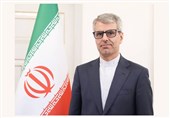Iranian MPs Seek Enhanced Parliament Role in Possible Nuclear Deal
TEHRAN (Tasnim) – More than 60 Iranian lawmakers have seconded a motion that, if passed, will require the parliament's ratification of a possible final nuclear deal between Tehran and world powers before its implementation, an MP told Tasnim.
Hossein Naqavi Hosseini, rapporteur of the parliament's national security and foreign policy commission, said on Saturday that the proposed bill, with double-urgency for being put to the vote, will be submitted to the presiding board when the supporters surpass 150.
According to the motion, any possible nuclear accord between Iran and the Group 5+1 (Russia, China, the US, Britain, France and Germany) will need to be ratified by the parliament, he explained.
Naqavi Hosseini also noted that under the new plan, a delegation of lawmakers will review the course of implementation of the likely deal and give reports to the parliament's presiding board every three months.
He said the move is a reaction to Washington's dual policies and history of breaching agreements in the past, explaining that Iran's Constitution gives such a right to the parliament.
Back in April, the US Senate Foreign Relations Committee passed a bill that allows the Congress to review a final nuclear agreement with Iran.
It requires the Obama administration to send the text of a final agreement to Congress as soon as it is completed, and blocks Obama's ability to waive many US sanctions on Iran while Congress reviews the deal.
Iranian President Hassan Rouhani has already downplayed the decision, stressing that Iran is engaged in nuclear talks with a group of six countries, not with the US Congress.
"What the US Senate says, what the US House of Representatives wants, what hardliners in the US seek, and what US puppets in the region say are none of our nation and government's business," Rouhani said on April 15.
On April 2, Iran and the Group 5+1 (also known as the P5+1 or E3+3) reached a framework nuclear agreement in Lausanne, Switzerland, with both sides committed to push for a final deal until the end of June.
They also held a three-day round of talks in Vienna on April 22-24 and started drafting the text of the long-awaited agreement.






